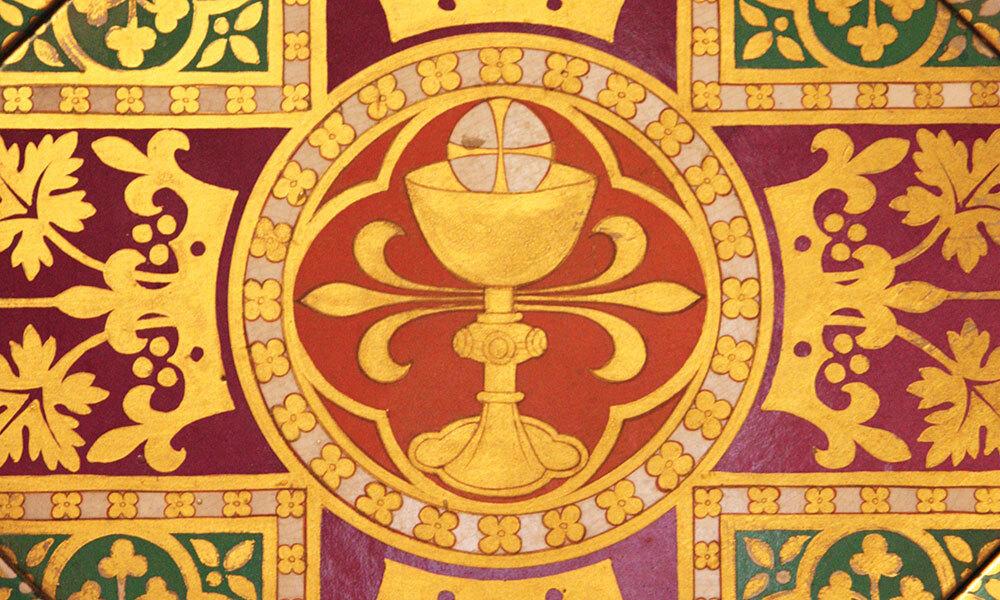
The Eucharist and the Moral Life
No one exists in isolation. Our very existence necessarily means that we are in relationship with the God who holds us in being – whether or not we want to acknowledge this. We are not solely victims of impersonal forces acting apart from us, but we are actually agents that help create these forces. The political, economic, social, environmental, technological and spiritual structures of society are the result of individual and collective human acts in relation to God, neighbor, self and creation. Individual decisions and relationships create the society in which one lives. This society then acts back upon the individual in a like manner. Thus, every human act (acts that are freely chosen and deliberate [cf. CCC 1749]) is a moral act.
A moral act
If every human act is a moral act, we had better revisit how Catholic moral theology evaluates the morality of an act. Upon inspection, we learn that there are three components to every moral act: the object, the end and the circumstances. The object of an act is what is actually done. The end of an act is why the act was done or for what ultimate purpose. The circumstances consist of all other factors that have a bearing on the act. An act is only morally good, or ordered to the good, if all three components are morally good.
For example, we all have most likely heard the saying, “the ends do not justify the means.” Consider stem cell research. The “ends” for which stem cell research is undertaken are the cures of many different diseases and conditions, such as Parkinson’s disease or paralysis, respectively. These ends are certainly admirable and ordered to the good. However, to achieve these ends by means of destroying living human embryos as is done in embryonic stem cell research renders the entire act immoral. The morality of the ends cannot compensate for the immorality of the means. An act will be morally evil if any of the three components are morally evil. Again, all three components (object, end and circumstances) must be morally good for the act itself to be morally good.
A view to eternity
Human acts ordered to the good are morally good and thereby help produce further moral order. Since all goodness derives from God, who is ultimate goodness, human acts that are morally good also orient us to the eternal good, conform us to it and ultimately unite us with it. We were created freely, out of love, by God for eternal life in communion with God. From the Catholic perspective, then, every human act, which again is an act necessarily in relationship, has eternal implications. They are ordered to an end (good or bad) beyond the immediate, temporal end.
A reference we have used before is St. John Paul II’s apostolic exhortation, Ecclesia in America. In this work, the late pontiff described the work of the Holy Spirit as building and restoring communion. Communion is, in fact, a fruit of the Spirit in that only the Spirit can bear it forth. Communion then becomes another evaluative criteria for determining the morality of any political, social, economic, technological or environmental policy. Every decision impacts the human person’s relationship with God, neighbor, self and creation, and therefore represents a “yes” or a “no” to the greater communion humanity was destined to share eternally with God.
So, to a culture that increasingly asserts that nothing ultimately matters since there is no such thing as objective truth or that only results matter, the Catholic Church boldly proclaims, “No, everything matters (the object, the end and the circumstances) – and it matters infinitely!”
The gold standard
The Gospels provide us with guidance as we seek to properly order our actions. Perhaps no other instruction is more widely known than the Golden Rule: “Do to others whatever you would have them do to you.” (Mt 7:12 cf., Lk 6:31) However, the Gospels go on to give us clear reasons why this rule is so important:
Blessed are the merciful, for they will be shown mercy. (Mt 5:7)
Forgive us our debts, as we forgive our debtors. (Mt 6:12)
If you forgive others their transgressions, your heavenly Father will forgive you. (Mt 6:14)
We should do to others what we want them to do to us because what we do to others will be done to us – eternally! The next level
The next level
Yet the radical unity of life is even more profound. Consider the following passage:
On his journey, as he was nearing Damascus, a light from the sky suddenly flashed around him. He fell to the ground and heard a voice saying to him, “Saul, Saul, why are you persecuting me?” (Acts 9:3-4)
Jesus poses this question to Saul. Notice that Jesus does not ask Saul why he was persecuting the people or, more precisely, his followers. Rather, his question reveals that the persecution being inflicted upon others was being, in fact, inflicted upon him. If there is any doubt of this, one needs only read Matthew 25, where Jesus makes it quite explicit.
So where does this bring us? We should do to others what we want them to do to us because what we do to others will be done to us eternally (i.e., we do it to ourselves). What’s more, what we do to others, and thereby ourselves, we do to Jesus Christ and the Holy Trinity.
THE EUCHARIST AND THE MORAL LIFE
In the Encyclical Ecclesia de Eucharistia, St. John Paul II reminds us, “Every commitment to holiness … must draw the strength it needs from the Eucharistic mystery and in turn be directed to that mystery as its culmination.” As moral theologian, Father Real Tremblay, C.SS.R. observes, St. John Paul argues that the eucharistic mystery not only calls us to appropriate behavior, but it demands a morality of praise, service and commitment to the present world, as well as to eternity.
Out of obedience to the Father, Jesus loved his sisters and brothers, even to death on the cross. This sacrifice of the cross is made present to us in the Eucharist. All those who participate in the Eucharist are, therefore, directed to go and do the same; to incarnate this same spirit of service so that all might have life to the full through the Jesus’ resurrection.
Sources:
Ecclesia de Eucharistia (2003) Saint John Paul II
Father Réal Tremblay, C.Ss.R., “The Moral Life is Intimately Tied to the Holy Eucharist,” Catholic Culture.org
FOR FURTHER REFLECTION
Consider this passage:
Stop judging and you will not be judged. Stop condemning and you will not be condemned. Forgive and you will be forgiven. Give and gifts will be given to you…For the measure with which you measure will in return be measured out of you. (Lk 6:37-38)
1. How does this passage address the radical unity underlying human existence?
2. What are the implications of this passage for the moral life?



